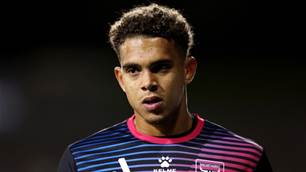Just 10 months ago there were those pointedly asking whether Tony Gustavsson was the right man to lead the Matildas into the Women’s World Cup.
Defeat on home soil against Canada had ladled another dollop of pressure on the erudite Swedish hipster, leaving him with 13 losses and just eight wins from his 26 games in charge.
Statistically his win record was a less than stellar 30 per cent, with another low point being a quarter-final Asian Cup exit the previous January in India despite the Matildas being favoured to flourish.
Whilst several hanging judges had already rushed to justice, the opinion of the man who mattered most, FA chief executive James Johnson, was unwavering and unequivocal.
It was Johnson who appointed the former USWNT assistant as the best qualified successor to Ante Milicic. And Johnson’s strategy for the Matildas has forever coalesced around a long-term vision rather than instant gratification.
Since that inflection point against Canada, a 1-0 loss last September, Gustavsson’s Matildas have won eight of their last nine, including the scalps of England, Spain, Denmark and Sweden, to justify Johnson’s policy of backing in coaches, playing the long game and ignoring the peanut gallery.
“We did a historical performance analysis on the Matildas in early 2020 and learned that not enough Matildas were getting match minutes and we needed to build depth,” Johnson told FTBL.
“We also learned that we hadn’t performed well against the top teams in the world - so those were the challenges we faced when Tony took charge.
“So, from a strategic point of view, we wanted Tony (who was appointed in September 2020) to create depth by giving younger players opportunities with the long view being the Women’s World Cup.
“We also made it our business to play top 10 ranked nations, and that’s what we’ve asked Tony to do and that is what he has done.
"By the time we play France on Friday night (the Matildas’ final WWC warm-up) we will have played every top 10 team in the world over the last two-and-half years, and that’s a deliberate strategy and we wanted to invest in that.
“When you decide to implement a strategy you have to see it through, even though there are going to be times when people question whether or not you’re on the right path. This is normal in a change process.
“We needed to be resilient and absorb stress as an organisation and that’s what we have done. It’s been a tough process for Tony and the team."
Thanks to Johnson’s unflappability and loyalty - and Gustavsson’s ability to expand his options by identifying and integrating a new generation of talent - the Matildas look to be in prime shape heading into their Group B clashes on home soil against Republic of Ireland, Nigeria and Canada this month.
Beyond the logistics of team structure and tactics - all the domain of Gustavsson - Johnson is also in the business of legacy building, for the benefit of the football eco system.
“I like to talk about FA being a local and global organisation - with the aim of bringing meaningful global competitions to our local community,” he said.
“What’s coming up over the next six weeks isn’t just about delivering great football and creating wonderful memories, it’s about using the power of this tournament to transform the sport.
“That transformation is happening around us right now. For example, we’re seeing more participants than ever among both girls and boys, we’re seeing more investment into facilities at grassroots levels and we’re seeing investment into professional game stadia - HBF, Hindmarsh and AAMI Park have all had upgrades.
“The Women’s World Cup will only speed up this process of transformation we are now seeing.”
Since his appointment in late 2019, former City Football Group and FIFA executive Johnson has navigated the turbulent waters of unbundling the A-League and reinvigorated an FA balance sheet smeared in red ink when he took charge.
There’s been talk of him ultimately returning to Zurich as FIFA president Gianni Infantino’s general secretary, in place of Fatma Samoura - a role of unprecedented influence never before bestowed upon an Aussie.
However, Johnson played down these talks and says he is focused on growing Australian football.
“My focus is on Australia co-hosting and delivering the best ever WWC and I believe that come on 20 August 2023, we will be talking about having accomplished that,” he predicted.
“So much of the work has already been done and we’re almost on auto pilot now. The best ever WWC would elevate the sport to unprecedented levels in Australia.
“But what does that really mean? Well, it’s about creating a legacy beyond great memories of the tournament. More participants, more community facilities, better stadia, more high performance facilities and a new generation of leaders, particularly women, throughout the sport.
“Once the best ever WWC is delivered and the legacy of the tournament is tangible, then we can ask the question of what’s the next big tournament we bring to our shores.
"We’re already bidding for the next Women’s Asian Cup and FIFA has recently established a revamped Club World Cup for 2025 that will be held in the US, but 2029 is open.
“Beyond that are the 2030 and 2034 World Cups, all these tournaments are considerations.”
Related Articles

'He has big potential': UK move on cards for Bulls young gun

Meet the last Aussie standing at Celtic













